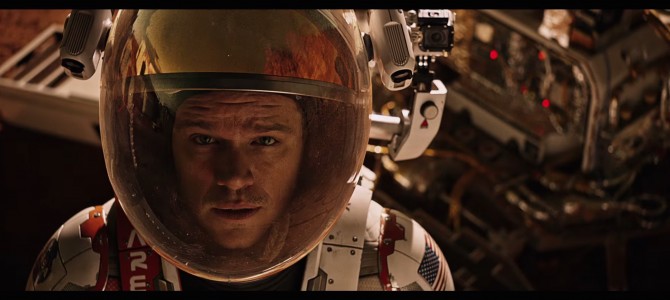Ridley Scott’s enjoyable space drama “The Martian” feels like a throwback to the days when American know-how and determination promised a brighter future ahead. Like many space sagas, both fact and fiction, “The Martian” aspires to build a better world and inspires the viewer to sign on.
Matt Damon stars as Mark Watney, an astronaut on a manned mission to Mars. In the exciting opening sequence, disaster strikes and Commander Lewis (Jessica Chastain) heads her ship for home. Watney, presumed dead, is left behind on the red planet. The rest of the film shows Watney solving, or failing to solve, problem after problem as he fights to survive until the next space ship is due to arrive.
The movie, and the book by Andy Weir on which it is based, prides itself on no-holds-barred realism. You won’t find any little green men or deus ex machina coincidences here. Watney does not stumble upon an undiscovered ocean of water or suddenly find that Mars supports nutritious and delicious life.
Instead, he is stranded in an endless desert with unbreathable air, limited food, and no means of communication.
Bringing a Dying Character to Life
Damon makes Watney both believable and relatable. His character forges ahead with a wry, black humor that feels more realistic than unbridled heroism or maudlin emotion. Likewise, the crew of his ship and scientists back on earth act like real people, with a mix of emotion, determination, and frustration.
The relationships among the crew of Watney’s ship are especially well-portrayed. These are professionals, scientists who just happen to work in space. There is a deep affection and loyalty between Lewis and Watney unmarred by any hint of romance or sexual attraction. They are colleagues, friends, and teammates. Although they have each other’s backs, they have their own personal lives.
Scott moves the story forward with the beats that show he can still be a consummate storyteller, something in doubt with his recent films “Prometheus” and “Exodus: Gods and Kings.” The film keeps you engaged and dazzles you with science. Even more unexpectedly, there is nothing to keep you from watching it with the kids except for some salty language that earns the film a PG-13 rating.
If they are young and unjaded enough, they might even be inspired. Scott’s message, hammered home in a final scene, is that human beings who work hard can solve problems. With echoes of movies like “Apollo 13” and “The Right Stuff,” the film hearkens back to the days when America was not crippled with self doubt, but filled with optimism about the ability to overcome. It has a roll-up-your-sleeves quality to it that we need to revive. This optimism feels oddly fresh in the current cultural landscape.
More Extraterrestrial than Existential
This being a Ridley Scott and Matt Damon work, it veers toward blatant humanism, the belief that human beings can and will build a perfect world. Brief mentions of God are just that—brief and unexplored. Salvation comes in this movie through science applied by rational, calm scientists. There is no room for transcendence beyond the beauty of the universe.
In this context, however, that is okay. Scott inserts hints of his atheistic humanism, but this is not a preachy or message movie on that front. Rather, he finds common ground with those of us who are tired of dark apocalypses and hopeless post-apocalypses.
This movie says don’t worry so much—we can handle the problems life throws at us. Find one solution, then the next, and do not despair. Exciting, interesting, and hopeful, “The Martian” is not the best movie of the year, but it is darn good.









